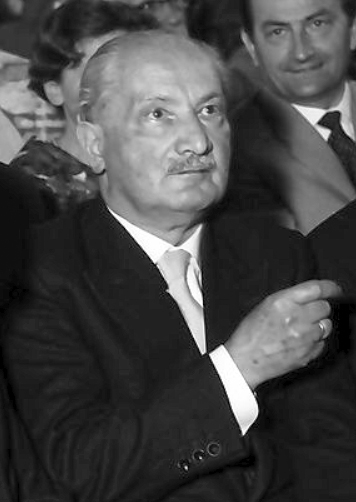Martin Heidegger frasi celebri
La sentenza di Nietzsche «Dio è morto», La Nuova Italia, Firenze 1979, p. 246
Sentieri interrotti
“Solo se davvero erriamo – ci perdiamo, possiamo imbatterci nella "verità."”
[...]
Nur wenn wir wirklich irren – in die Irre gehen, können wir auf »Wahrheit« stoßen. [...]
Origine: Da Schwarze Hefte, Überlegungen II, n° 23, ottobre 1931; in Gesamtausgabe, vol. 94, a cura di Peter Trowny. Francoforte sul Meno, Vittorio Klosterman GmbH, 2014, p. 13.
Frasi su come pensare di Martin Heidegger
Letter on Humanism
“Lo psichiatra ha bisogno dello psichiatra.”
citato in Roudinesco Elisabeth, Jacques Lacan. Profilo di una vita, storia di un sistema di pensiero, Cortina, 1995
citato in Risposta [a colloquio con Martin Heidegger], traduzione di Carlo Tatasciore, Guida, Napoli, 1992, pp. 267-268. ISBN 978-88-6042-258-3
Frasi su tempo di Martin Heidegger
da Il concetto di tempo, 1924, Adelphi
dalle Lezioni del semestre invernale 1937-38
Origine: Soggiorni, p. 24
Occident] e dell'"Oriente" e attraverso ciò che è europeo – il luogo della storia futura più originariamente conforme al destino [geschickt]? (Il detto di Anassimandro, 1946, p. 303)
da La questione dell'essere, in Oltre la linea
Origine: Fra tutti gli ospiti.
Martin Heidegger Frasi e Citazioni
“Il linguaggio è la casa dell'essere e nella sua dimora abita l'uomo.”
dalla Lettera sull'umanismo
“Il Sacro congiunge il Divino. Il Divino avvicina Dio.”
Perché i poeti?
Sentieri interrotti
“[…] io sono un «teologo cristiano»”
da una lettera del 19 agosto 1921 a Karl Löwith
Origine: Citato in Franco Volpi, Guida a Heidegger: [Ermeneutica, Fenomenologia, Esistenzialismo, Ontologia, Teologia, Estetica, Etica, Tecnica, Nichilismo], Laterza, Bari-Roma, 2018, p. 62 https://books.google.it/books?id=Kk9tDwAAQBAJ&lpg=PT62&dq=&pg=PT62#v=onepage&q&f=false. ISBN 9788858134306
Essere e tempo
"... Dicterische Wohnet der Mensch ..."; citato in George Steiner, Dopo Babele, p. IX
da Che cosa significa pensare?, in Saggi e discorsi
da Nietzsche, traduzione di F. Volpi, Adelphi, Milano, 1995
L'epoca dell'immagine del mondo
Sentieri interrotti
L'epoca dell'immagine del mondo
Sentieri interrotti
da una lettera a Hans-Georg Gadamer del 2 dicembre 1971, in: Gadamer, La dialettica di Hegel, traduzione di R. Dottori, Marietti, Genova 1996, p. 187
da Ormai solo un dio ci può salvare, traduzione di A. Marini, Guanda, Parma
da Solo un dio ci può salvare, Guanda, Parma 1987, p. 137
“L'uomo è il pastore dell'Essere.”
dalla Lettera sull'umanismo, a cura di Franco Volpi, Adelphi, Milano 1995, p. 56
citato in Ann van Sevenant, Il filosofo dei poeti: l'estetica di Benjamin Fondane, Mimesis, 1994
da Beitrage Zur Philosophie: Vom Ereignis, 1938, in Contributions to philosophy: from enowning, Indiana University Press, 1999, p. 123
citato in Ralf Dahrendorf, Erasmiani, traduzione di M. Sampaolo, p. 6
citato in Georg Trakl, Poesie, introduzione, traduzione e note di Ervino Pocar, Rizzoli, Milano, 1974, p. 155
“La tecnica è la forma più raffinata della più durevole proletarizzazione.”
Origine: MARTIN HEIDEGGER, Riflessioni XII-XV, Bompiani, 2016, pag. 163
Martin Heidegger: Frasi in inglese
“In its essence, technology is something that man does not control.”
Der Spiegel Interview with Martin Heidegger, 1966
“We ourselves are the entities to be analyzed”
Macquarrie & Robinson translation, ¶9
Being and Time (1927)
Introduction: The Exposition of the Question of the Meaning of Being (Stambaugh translation)
Being and Time (1927)
Introduction: The Exposition of the Question of the Meaning of Being (Stambaugh translation)
Being and Time (1927)
Introduction: The Exposition of the Question of the Meaning of Being (Stambaugh translation)
Being and Time (1927)
What Is A Thing? (1935, 1968)
is historical, because every report of the past, that is of the preliminaries to the question about the thing, is concerned with something static. This kind of historical reporting is an explicit shutting down of history, whereas it is, after all, a happening. We question historically if we ask what is still happening even if it seems to be past. We ask what is still happening and whether we remain equal to this happening so that it can really develop. p. 43
What Is A Thing? (1935, 1968)
We lay this written statement beside the thing of which it is the truth. After the lecture is finished both doors are opened, the classroom is aired, there will be a draft, and the scrap of paper, let us suppose, will flutter out into the corridor. A student finds it on his way to the cafeteria, reads the sentence. "Here is the chalk," and ascertains that this is not true at all. Through the draft the truth has become an untruth. Strange that a truth should depend on a gust of wind. ... We have made the truth about the chalk independent of us and entrusted it to a scrap of paper. p. 29-30
What Is A Thing? (1935, 1968)
